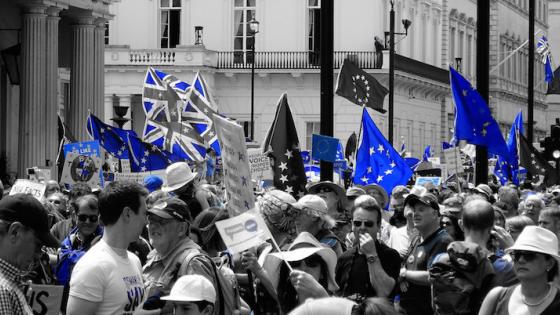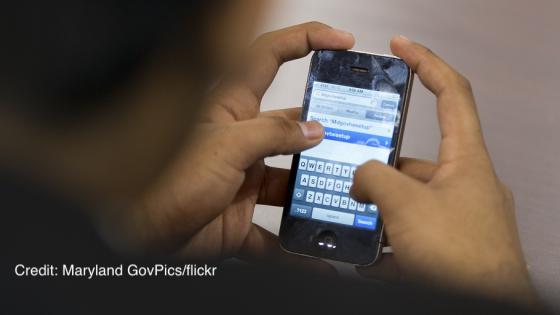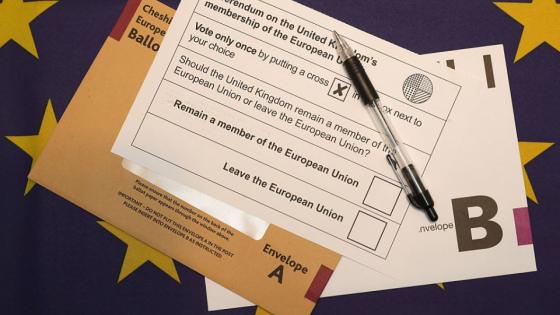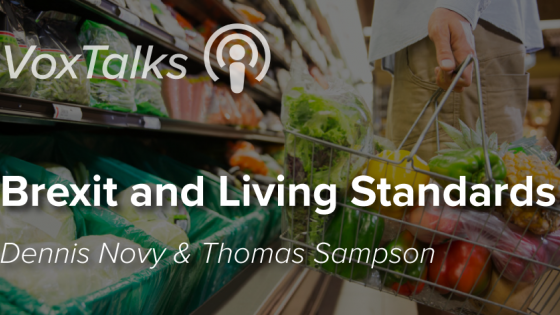First posted on:
mainly macro, 24 June 2018.
Last week saw leading lights in one mass movement, the Labour party, attack elements of another mass movement, those who want to remain in the EU. What led to this attack seemed to be posters issued by an organisation called OFOC depicting John McDonnell in the pocket of arch Brexiter Jacob Rees-Mogg. My own view is that these posters were a waste of money and hardly worth bothering with. But leading lights in the Labour movement tried to suggest to grass roots Remain supporters that they are being used as a way to attack Corbyn, as here for example.
As it happens, I have quite recently suggested that some Remain campaigners risk the danger that their message is sounding very similar to the numerous anti-Corbyn attacks you can find throughout the media. For example, suggesting that the only thing in the way of stopping Brexit is Corbyn (ludicrous) and that therefore he has to go (won't happen). As the only chance of a vote on the final deal is if Labour supports it such a message is positively counterproductive.
However, the attacks from Bastini, Mason and others took a different tack, listing in great detail how OFOC was connected to, and possibly funded by, certain Tory and LibDem figures. This was the basis of the ‘being used’ claim. There are two big problems here. First, Remain is a cross-party movement. So what exactly is the big deal with establishing all these links? So what, you might say. Second, Remainers have every reason to be critical of Labour policy, which is now clearly not to stay in the EU.
The days of triangulation are over. We now know that the Labour leadership wants a negotiated deal with the EU that has some safeguards on nationalisation etc, and for some MPs at least some limits to free movement. As the great majority of Labour members and voters support staying in the EU, this is a difficult position for the Labour leadership to take. Labour are therefore acutely vulnerable. Indeed, as there is a chance that Labour might back a people's vote but May never will, it is sensible that Remainers now concentrate any pressure on the Labour leadership.
Picking a fight with some Remainers by suggesting they are, knowingly or not, just an anti-Corbyn front because they attack Labour on Brexit seems to both miss the point and to be terrible politics. I guess it can be what happens when two mass movements with considerable overlap in terms of membership clash. Of course any Brexit negotiated by Corbyn would be less harmful than the Brexit May might be able to negotiate, and Labour still might vote against the final deal and support a referendum on it, but until Labour do start saying that no Brexit is better than May’s Brexit, Labour are vulnerable and have to accept that Remainers will try and put pressure on them.
All of which is of course a minor sideshow to what will be the main story of the next few months: will May be able to negotiate a deal with the EU? Labour are completely irrelevant in answering this question. The answer will depend on whether May will finally break with the Brexiters, and how much these Brexiters react to this rejection. The deal that will be done, which involves at a minimum being in the Customs Union and the Single Market for goods, is anathema to most of the Brexiters based on their past behaviour. That deal, as I have argued before, represents the almost complete failure of the Brexiter project.
The Brexiters have two choices. They can try and make it as hard as possible for May such that she fails to get a deal, and hope that the UK leaves with no deal as a result. Although there is much you can criticise in May as a prime minister, her stubbornness probably means she will not allow her deal to be sabotaged in this way, but that will probably not stop the Brexiters trying. The second choice Brexiters have is to park their displeasure at the deal until we leave in 2019, and hope that they can achieve further breaks from Europe subsequently, perhaps by getting a Brexiter as Conservative party leader. The problem with this strategy is that time is not on their side: demographics, losing the Mail, and people seeing how the UK steadily falls behind the rest of the EU are just some of the reasons why.
There is no doubt that May will do what she can to get a deal, and I suspect the Brexiters will not have the support or the will to stop her once she stops appeasing them. Which leaves Labour in a dangerous position, where they may alienate Leavers by voting against the deal, and alienate Remainers for not supporting Remain. The days when they could keep both groups happy by triangulating, and almost win a general election, are over. They cannot be crazy enough to vote for or abstain on the final deal, because then they become complicit in all the economic harm that Brexit will do, as well as alienating the majority of its own members and voters. It would mean four years of Labour losing Leave voters to the Conservatives (as the Brexit press would spin anything other than a vote for the deal as Labour opposing Brexit), and losing Remain voters to the LibDems or Greens.
One thing we have learnt in the last week is that most of the handful of Tory rebels will not have the courage to vote against any deal May makes. (No deal is another matter.) So Labour will lose the parliamentary vote on the final deal. Labour are not in government, and the deal is being done now, so what they would want to do in government is irrelevant. That means that they have little to lose by backing the popular people’s vote against May’s deal as well as voting against that deal. No Brexit is better than May’s Brexit. That way, they allow the two movements to march as one.




